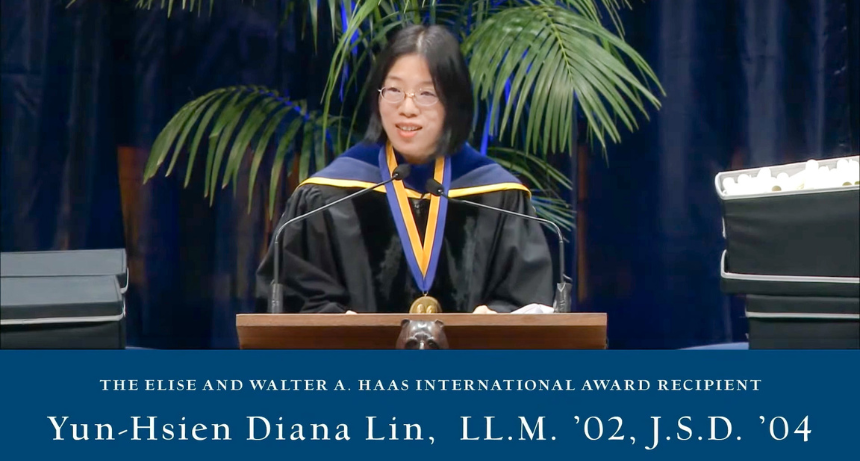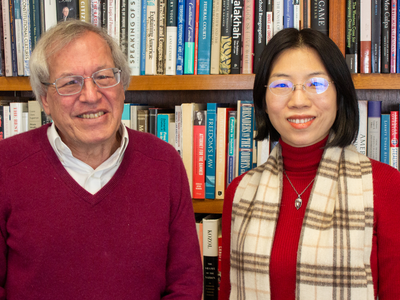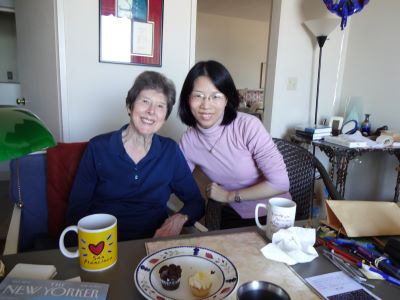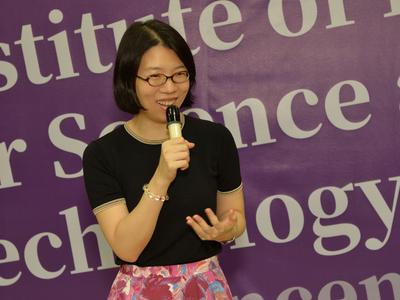
By Andrew Cohen
Berkeley Law may have been more than 6,500 miles away, but Yun-Hsien Diana Lin felt a close connection to its public mission. Working as a research assistant in the Taiwan Legislative Yuan (Congress), she developed a powerful passion for social justice, especially gender issues.
“That’s why I chose Berkeley Law for my LL.M program,” Lin says. “It has long been famous for its courses and programs on social justice.”
Twenty years later, Lin returned to Berkeley to receive the prestigious Elise and Walter A. Haas International Award, which honors a UC Berkeley alum who is a native, citizen, and resident of another country and has a distinguished record of service to that nation. A law professor at National Tsing Hua University in Taiwan, Lin was the main architect of a 2019 bill that made Taiwan the first Asian nation to legalize same-sex marriage.

After receiving her LL.M. degree in 2002, Lin stayed at Berkeley Law and earned a Doctor of Juridical Science — the school’s most advanced degree — which prepares graduates to excel in teaching and legal scholarship around the world.
“For 18 years of advocacy and research for gender equality, LGBTQ rights, and reproductive justice, I’ve never forgotten what I learned while studying in Berkeley,” Lin says. “Although I’m deeply honored to receive this award, I’m also humbled, especially after viewing the profile of past recipients. To me, it’s a major recognition that what I’ve been doing exemplifies the values of UC Berkeley.”
A pursuit born in Berkeley
Lin wrote her LL.M. thesis on legalizing same-sex marriage, and kept an eye on relevant cases. She published articles about legal issues faced by lesbian couples in Taiwan who wished to become parents, was consulted by the Ministry of Justice about legal amendments in family law, and in 2016 got commissioned to study and draft the nation’s Same-Sex Partnership Act.
Her draft report of over 500 pages — laying out the formation, dissolution, rights, and responsibilities of same-sex partnership— formed the backbone of the bill. In March 2019, two months before the act was passed, Lin was tapped to answer questions and assess its sustainability before members of Taiwan’s Congress and Legal Affairs Bureau.
“We looked into same-sex partnership laws in other countries through comparative law, then in-depth interviews of family law professors were held to form the framework of the draft,” Lin says. “Also, focus groups were conducted to interview family court judges, lawyers, and NGO representatives to gather their opinions. And finally, four civil conferences were held to discuss with local people, face to face, in the north, central, south, and east of Taiwan.”
During the drafting of the law, mass rallies for and against same-sex marriage took place in front of Taiwan’s Presidential Office, with tens of thousands of people. The issue sparked major media coverage and heated online debate.
“I was happy that I’m not an active user of social media so as to be shielded from those upsetting comments,” Lin says. “Nevertheless, I received lots of opinions through email, post mail, and even delivery in person suggesting various legal frameworks for matters regarding LGBTQ. It was absolutely the most difficult research project I’ve ever accomplished, but it was very rewarding.”
Meaningful mentorship
After presenting about Taiwan’s landmark legislation at the 2019 Law and Society Annual Meeting in Washington D.C., Lin dedicated the honor of being the bill’s main drafter to Herma Hill Kay. Berkeley Law’s first woman dean, Kay taught at Berkeley Law for 57 years and served as Lin’s faculty advisor before her death in 2017.

“I learned so much in her Sex-Based Discrimination seminar and Family Law class,” Lin recalls. “And Herma supervised my LL.M. thesis on the topic of same-sex marriage in the U.S. and later my J.S.D. thesis on domestic violence law. She was the one who encouraged me to become a professor in pursuit of gender equality. Even after I went back to Taiwan, she was my mentor through my early career in academia and after receiving tenure in 2011.
“I would email her my latest draft of an article and she’d send me her comments within a few days. And I had the honor to be invited to her home in San Francisco a couple of times, usually on my way to various conferences in the U.S. One of the most powerful ways that my Berkeley experience shaped my professional path is her mentorship.”
Lin also credits Nancy Lemon ’80, who directed Berkeley Law’s Domestic Violence Field Placement from 1990 to 2022, for instrumental guidance on her J.S.D. thesis. “She generously helped me by proofreading every chapter and providing feedback. I learned from her not only the method of academic writing, but also the spirit of fighting for social justice.”
Noting that Berkeley Law’s “amazing variety” of public interest-focused classes and numerous brown bag lunch talks on related topics greatly broadened her horizons, Lin adds that “they provided me with the vision of a professional path in pursuit of social justice.”
Valued voice in Taiwan
An expert in family law, reproductive justice, and gender equality, Lin publishes articles in both Taiwanese and major international law journals. She has tackled topics such as same-sex marriage, lesbian parenting, child adoption, child abuse, involuntary sterilization of mentally disabled people, disclosure of sperm donors’ identities, and access to assisted reproductive technologies.
As a committee member of the Executive Yuan for the Prevention of Human Trafficking and the Elimination of Racial Discrimination, Lin helped coordinate Taiwan’s first country report for the International Convention on the Elimination of All Forms of Racial Discrimination.

“I am honored to be part of the international human rights protection agenda against racial discrimination,” she says.
Lin also advises Taiwan’s Ministries of Justice, Interiors, and Health and Welfare, is a founding board member of the Taiwan Family Law Society, frequently speaks at international conferences, and teaches courses for the Taiwan Judges Academy, Taipei Bar Association, and various government departments.
A member of the Taiwan Ministry of Health and Welfare’s Reproductive Health Advisory Committee, her latest efforts have been directed to a proposed amendment to the country’s Reproductive Health Act, including arguing against requiring a husband’s consent for an abortion. In addition, to protect mentally disabled individuals from involuntary sterilization, Lin proposed procedural safeguards and substantial criteria in amending the current laws.
While the issue of gay marriage continues to polarize, Lin was grateful to see more than 200,000 participants from all over the world take part in Taiwan’s LGBT Pride Parade in October 2019 — and the steadily growing acceptance of same-sex couples since then.
“To most Taiwanese people, legalizing same-sex marriage is the right thing to do, even to be proud of,” she says. “In terms of how to change the traditional conservatives, I believe that personal experiences trump rumors and correct bias. When more and more same-sex couples participate in their children’s school activities and voluntary work, other parents and society as a whole will gradually realize they are just as ‘normal’ as any other parents in the school district.”